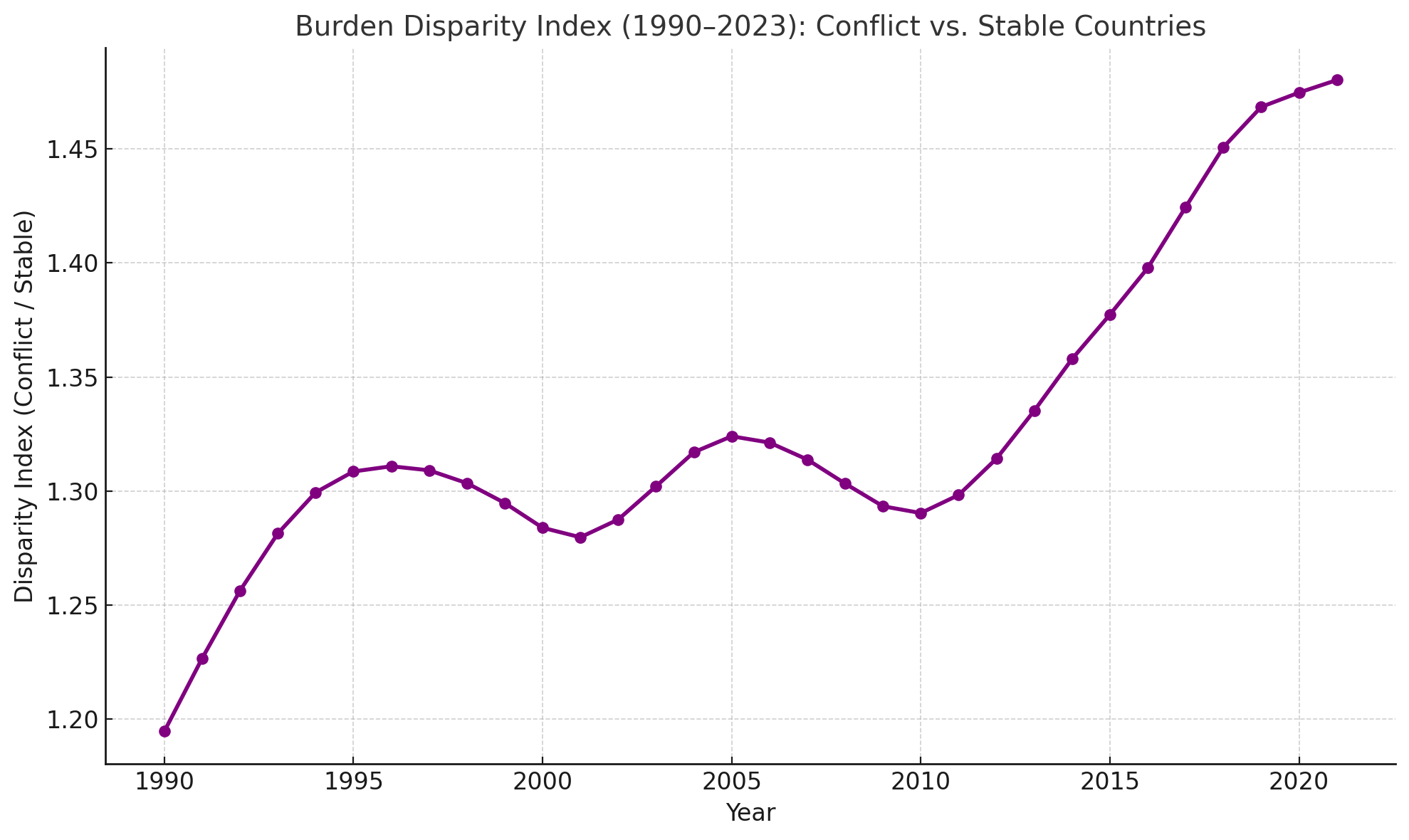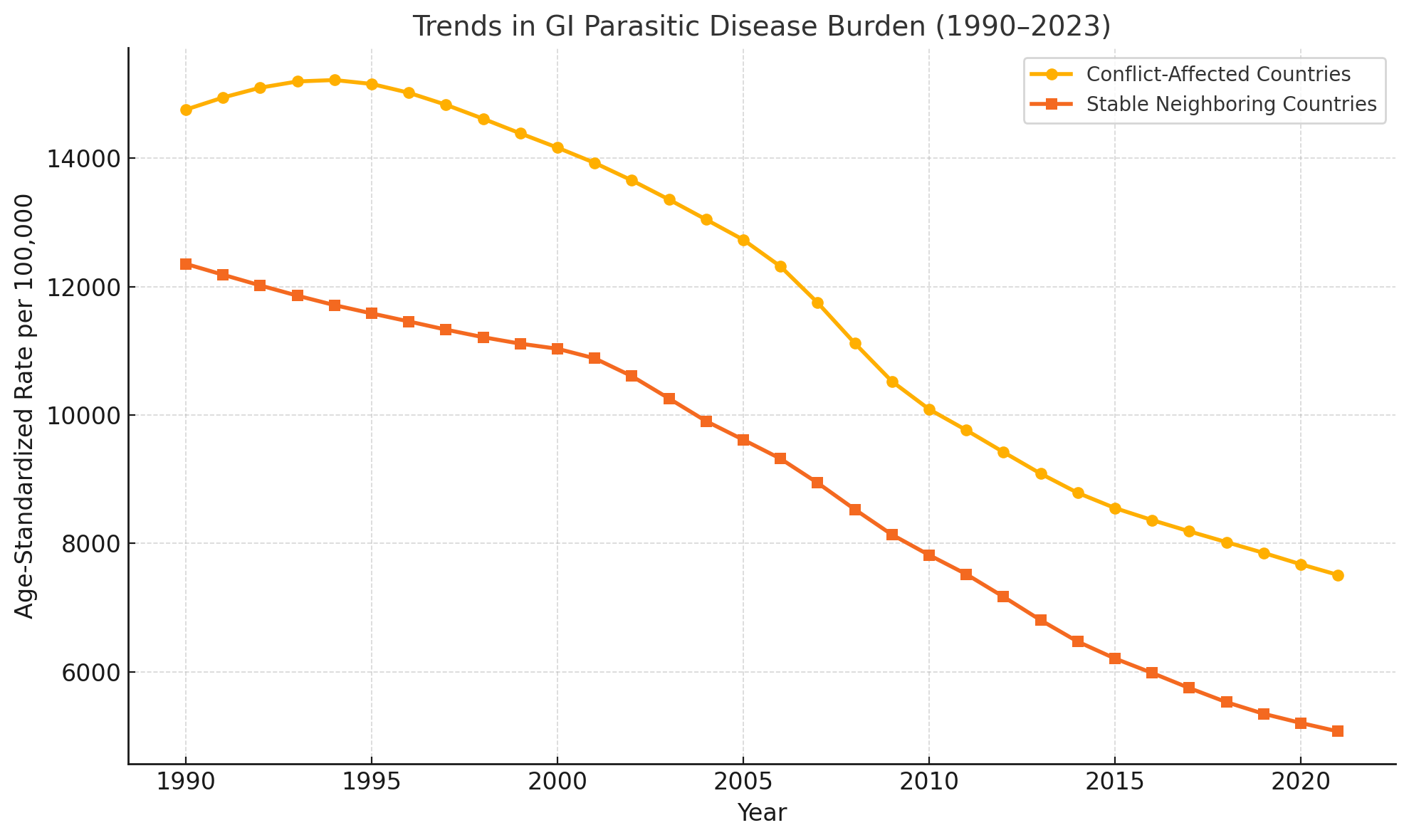Sunday Poster Session
Category: Infections and Microbiome
P1285 - A GBD-Based Comparative Analysis of Gastrointestinal Parasitic Burden in Conflict-Affected Nations and its Clinical Relevance for US Gastroenterologists
Sunday, October 26, 2025
3:30 PM - 7:00 PM PDT
Location: Exhibit Hall

Sweta Sahu, MBBS (she/her/hers)
J.J.M. Medical College
Bhubaneswar, Orissa, India
Presenting Author(s)
Sweta Sahu, MBBS1, Mohammed Saifuddin, MBBS2, Sadaf Iftikhar, MBBS3, Salma Younas, PharmD4, Dushyant S. Dahiya, MD5
1J.J.M. Medical College, Bhubaneswar, Orissa, India; 2Navodaya Medical College, Morgantown, WV; 3Akhtar Saeed Medical and dental college, Lahore, Punjab, Pakistan; 4University of the Punjab, Lahore, Punjab, Pakistan; 5University of Kansas School of Medicine, Kansas City, KS
Introduction: Gastrointestinal (GI) parasitic infections are often considered diseases of low-income countries, yet rising global migration has made them increasingly relevant to clinical practice in the United States. Refugees and asylum seekers from conflict-affected regions frequently present to U.S. hospitals with underdiagnosed parasitic infections, often mimicking common GI disorders. This study leverages the Global Burden of Disease (GBD) 2023 dataset to quantify global disparities in parasitic burden using a novel epidemiologic metric—the Burden Disparity Index (BDI)—and explores its implications for U.S.-based gastroenterologists.
Methods: Age-standardized rates of intestinal nematode infections were extracted for the years 1990–2023 from the GBD 2023 database. Countries were categorized into two cohorts: 12 conflict-affected nations (e.g., Syria, Yemen, Myanmar) and 12 stable, geographically adjacent neighbors (e.g., Jordan, Oman, Bangladesh). The Burden Disparity Index (BDI) was calculated annually as the ratio of average disease burden in conflict-affected countries relative to stable counterparts. Trends over time were visualized and analyzed.
Results: In 1990, conflict-affected nations had a parasitic burden rate 1.2 times higher than stable neighbors. By 2023, this disparity had nearly doubled, with a BDI of 2.2, indicating significantly worsening inequity. Stable countries achieved a 54% reduction in burden over the 30-year span, while conflict regions saw only a 12% decline. The most pronounced divergence occurred after 2010, corresponding with increasing geopolitical instability, disrupted healthcare access, and large-scale displacement.
Discussion: This growing disparity holds direct consequences for gastroenterologists in the United States. Many patients from high-burden regions are now seen in U.S. practices, often with non-specific GI symptoms such as bloating, abdominal pain, chronic diarrhea, or eosinophilia. These presentations can mimic or be misdiagnosed as irritable bowel syndrome (IBS), inflammatory bowel disease (IBD), or eosinophilic gastroenteritis. However, routine screening for GI parasites is often overlooked in adult patients. By highlighting global disease trends, the Burden Disparity Index emphasizes the need for clinical vigilance, targeted screening, and updated diagnostic protocols in diverse patient populations. Integrating global burden awareness into domestic GI practice is no longer optional—it is essential.

Figure: Age-standardized rates of gastrointestinal parasitic disease burden in conflict-affected vs. stable neighboring countries. Stable nations show significant progress, while conflict regions remain stagnant over three decades.

Figure: The Burden Disparity Index (conflict/stable rate ratio) shows increasing inequity in GI parasitic disease control. The sharp rise post-2010 reflects the long-term health consequences of sustained conflict and disrupted care.
Disclosures:
Sweta Sahu indicated no relevant financial relationships.
Mohammed Saifuddin indicated no relevant financial relationships.
Sadaf Iftikhar indicated no relevant financial relationships.
Salma Younas indicated no relevant financial relationships.
Dushyant Dahiya indicated no relevant financial relationships.
Sweta Sahu, MBBS1, Mohammed Saifuddin, MBBS2, Sadaf Iftikhar, MBBS3, Salma Younas, PharmD4, Dushyant S. Dahiya, MD5. P1285 - A GBD-Based Comparative Analysis of Gastrointestinal Parasitic Burden in Conflict-Affected Nations and its Clinical Relevance for US Gastroenterologists, ACG 2025 Annual Scientific Meeting Abstracts. Phoenix, AZ: American College of Gastroenterology.
1J.J.M. Medical College, Bhubaneswar, Orissa, India; 2Navodaya Medical College, Morgantown, WV; 3Akhtar Saeed Medical and dental college, Lahore, Punjab, Pakistan; 4University of the Punjab, Lahore, Punjab, Pakistan; 5University of Kansas School of Medicine, Kansas City, KS
Introduction: Gastrointestinal (GI) parasitic infections are often considered diseases of low-income countries, yet rising global migration has made them increasingly relevant to clinical practice in the United States. Refugees and asylum seekers from conflict-affected regions frequently present to U.S. hospitals with underdiagnosed parasitic infections, often mimicking common GI disorders. This study leverages the Global Burden of Disease (GBD) 2023 dataset to quantify global disparities in parasitic burden using a novel epidemiologic metric—the Burden Disparity Index (BDI)—and explores its implications for U.S.-based gastroenterologists.
Methods: Age-standardized rates of intestinal nematode infections were extracted for the years 1990–2023 from the GBD 2023 database. Countries were categorized into two cohorts: 12 conflict-affected nations (e.g., Syria, Yemen, Myanmar) and 12 stable, geographically adjacent neighbors (e.g., Jordan, Oman, Bangladesh). The Burden Disparity Index (BDI) was calculated annually as the ratio of average disease burden in conflict-affected countries relative to stable counterparts. Trends over time were visualized and analyzed.
Results: In 1990, conflict-affected nations had a parasitic burden rate 1.2 times higher than stable neighbors. By 2023, this disparity had nearly doubled, with a BDI of 2.2, indicating significantly worsening inequity. Stable countries achieved a 54% reduction in burden over the 30-year span, while conflict regions saw only a 12% decline. The most pronounced divergence occurred after 2010, corresponding with increasing geopolitical instability, disrupted healthcare access, and large-scale displacement.
Discussion: This growing disparity holds direct consequences for gastroenterologists in the United States. Many patients from high-burden regions are now seen in U.S. practices, often with non-specific GI symptoms such as bloating, abdominal pain, chronic diarrhea, or eosinophilia. These presentations can mimic or be misdiagnosed as irritable bowel syndrome (IBS), inflammatory bowel disease (IBD), or eosinophilic gastroenteritis. However, routine screening for GI parasites is often overlooked in adult patients. By highlighting global disease trends, the Burden Disparity Index emphasizes the need for clinical vigilance, targeted screening, and updated diagnostic protocols in diverse patient populations. Integrating global burden awareness into domestic GI practice is no longer optional—it is essential.

Figure: Age-standardized rates of gastrointestinal parasitic disease burden in conflict-affected vs. stable neighboring countries. Stable nations show significant progress, while conflict regions remain stagnant over three decades.

Figure: The Burden Disparity Index (conflict/stable rate ratio) shows increasing inequity in GI parasitic disease control. The sharp rise post-2010 reflects the long-term health consequences of sustained conflict and disrupted care.
Disclosures:
Sweta Sahu indicated no relevant financial relationships.
Mohammed Saifuddin indicated no relevant financial relationships.
Sadaf Iftikhar indicated no relevant financial relationships.
Salma Younas indicated no relevant financial relationships.
Dushyant Dahiya indicated no relevant financial relationships.
Sweta Sahu, MBBS1, Mohammed Saifuddin, MBBS2, Sadaf Iftikhar, MBBS3, Salma Younas, PharmD4, Dushyant S. Dahiya, MD5. P1285 - A GBD-Based Comparative Analysis of Gastrointestinal Parasitic Burden in Conflict-Affected Nations and its Clinical Relevance for US Gastroenterologists, ACG 2025 Annual Scientific Meeting Abstracts. Phoenix, AZ: American College of Gastroenterology.
